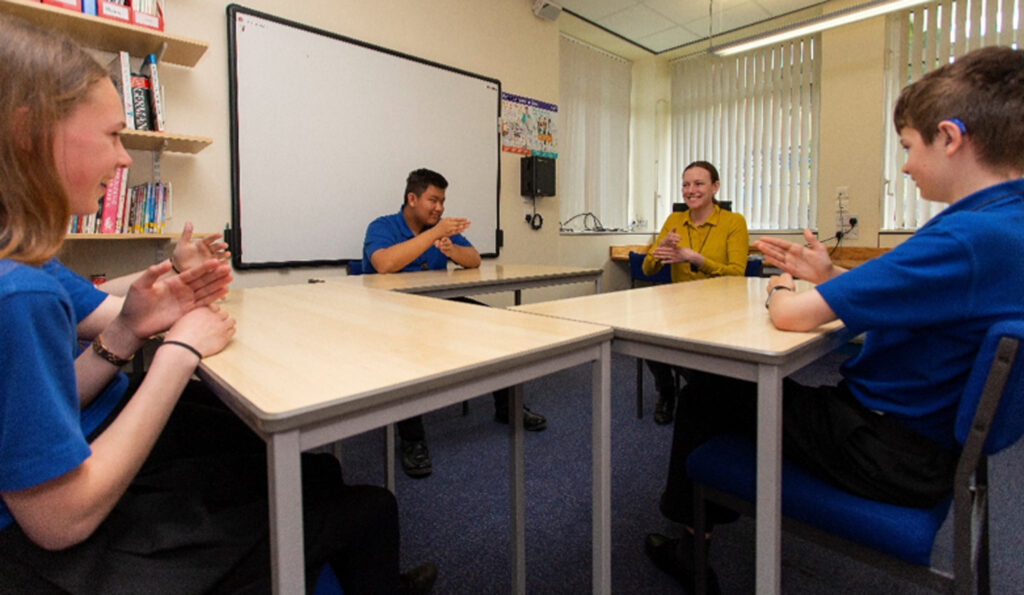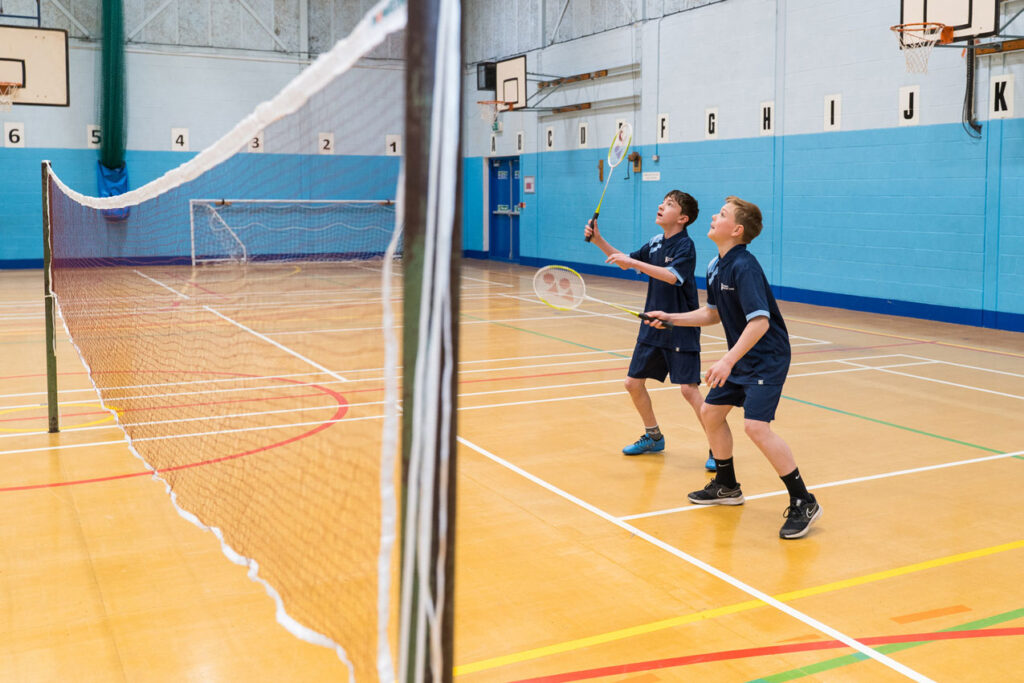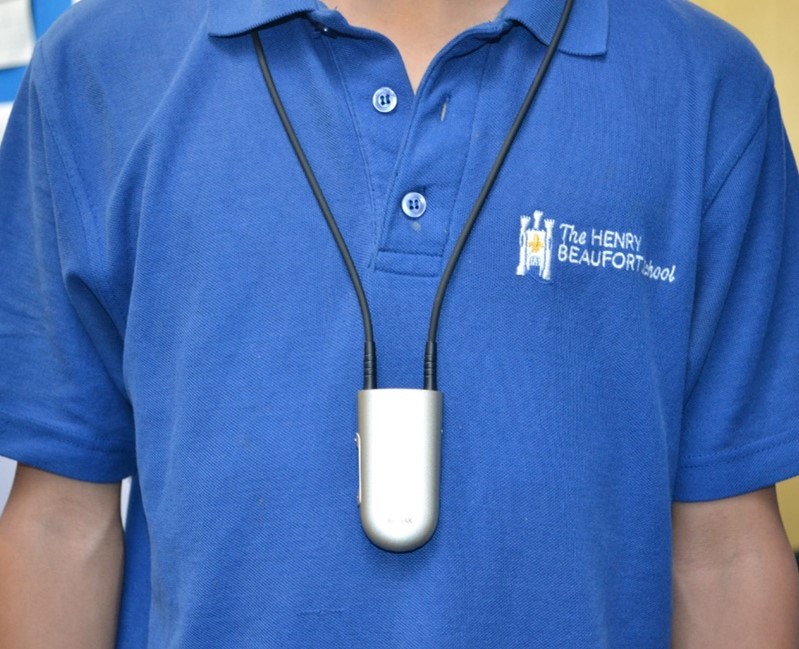Welcome to our Resource Base for the mainstream education of deaf and/or hard of hearing students with an Education, Health, and Care (EHC) Plan.
The Resource Base provides state-of-the-art facilities and is located at the heart of The Henry Beaufort School in Winchester Block. Our students form an integral part of the wider school community and spend a significant proportion of their lessons in mainstream classrooms.
Our students span a broad range of academic abilities, talents and personalities and we are proud of their contributions to the life of The Henry Beaufort School.
Aims
- To provide the resources, expertise and support to enable our students to realise their full potential: educationally, socially and personally.
- To develop students’ self-esteem, have ownership of their learning and be valued members of the school community.
About the Resource Base
The Resource Base was established in 1995. The present suite of rooms was purpose built in 2010 to provide an optimal acoustic environment for our students to enable them to work in a quiet area and develop their speech and listening skills.
The Resource Base comprises of seven rooms including a large teaching room, three tutorial rooms and an audiology room.
The provision is led by a qualified Teacher of the Deaf with a team of experienced Learning Support Practitioners and Communication Support Assistants (minimum BSL Level 3).
Many outside agencies, including NHS speech and language therapists, occupational therapists and physiotherapists, come to work with our students in familiar, relaxed surroundings. We also have strong links with the University of Southampton Auditory Implant Service (USAIS).
Communications Policy
At The Henry Beaufort School we follow a Total Communications Policy, whereby we use a number of modes of communication depending on the particular needs and abilities of our students.
Trained and experienced staff provide communication support through both oral and British Sign Language (BSL). Students attend mainstream lessons with their peers and if required, additional support within the Resource Base.
Every student has a personal-up-to date radio aid system to provide maximum access to the curriculum and to enhance their listening experience in mainstream classes.
Teaching staff are informed of the needs and requirements of each student and are appropriately trained to ensure that lessons are delivered effectively for all students.
A weekly British Sign Language (BSL) Club is run for the whole school community by our Communication Support Assistants.

Enrichment
Deaf Awareness
We pride ourselves on providing opportunities for every student to follow a broad and ambitious curriculum. The purpose of our 5-year curriculum is to support students in their cumulative knowledge and skills over time. We place value on both the academic and personal development elements that our curriculum offers.
We know that success comes from enjoyment and engagement. Our curriculum is based around our teaching of key concepts, prioritising depth and breadth and ensuring knowledge and understanding is gained in each subject across the five years.
Our curriculum embeds the criteria of the Key Stage 3 and Key Stage 4 National Curriculum and provides clear progression of subject knowledge and skills. The design of our five-year curriculum gives our students the skills and experience they need in order to access the next stage of their education, and realise their potential.
Student activities
Our students are involved in all aspects of school life and participate in a variety of school activities including team sports, sports council, drama productions and school trips and residentials.
As part of a programme to support personal, social and emotional wellbeing there are opportunities for our students to take part in a range of events organised by both local and national deaf organisations. Recent trips have included sailing and West End productions with specialist communication access.
We also work with local primary schools to give deaf and/or hard of hearing primary school students the opportunity to attend events organised by the Resource Base. Staff and our students have hosted workshops in a variety of subjects, including science, music and art.

Equipment
We ensure optimal use of hearing aids, cochlear processors and radio aids, and empower our student’s independence by encouraging them to take responsibility for their daily monitoring.
In the classroom all our students use the latest digital radio aid systems. The teacher wears a transmitter enabling students to have an improved listening experience in the mainstream classrooms, as this ensures the teacher’s voice has priority over any background noise.
The transmitter can also be worn by the Communication and Learning Support Assistants and practitioners when working individually with the students. Students are encouraged to use different modes depending on the environment, such as Table mode for when they are working in small groups. This will also enable students to consider how technology may help them in their further studies and the world of work.

School routine
- Our students come to the Resource Base each morning, before the start of school, to check that their hearing aids, cochlear implants and radio aid systems are working properly.
- Following testing, students attend a spelling and reading programme during morning tutorial sessions where they are encouraged to develop their vocabulary and further their awareness of current affairs. If necessary, pre-tutoring and review of lessons also takes place.
- Students then attend a five minute tutor registration session with their hearing peers, before either going to mainstream lessons or being withdrawn for specialist teaching in the Resource Base. This is dependent on individual needs.
- The after school routine comprises of 20 minutes one-to-one individual support with a focus on individual targets and the reinforcement of key concepts. Students can also spend this time with their deaf and/or hard of hearing peers.
- After-school Home Learning Clubs are open to all students. A wide variety of extra-curricular activities, such as sport or drama clubs, are also available.
Support in school
The Resource Base team support individual students in mainstream lessons, clarifying and explaining any new language. We complete student support sheets every lesson, enabling us to check on any reinforcement that may be required.
Our Communication Support Assistants use British Sign Language (BSL) and Sign Supported English (SSE) in the classroom, when required, to help our student’s access the curriculum.
The specially designed tutorial rooms within the Resource Base are used for one-to-one tutorials to allow for the preparation and reinforcement of the curriculum as well as the development of literacy, vocabulary and communication skills. These tutorials can also take place before tutor registration time in the mornings, and at the end of the school day. If applicable, and only in close liaison with parents, students can also be withdrawn from mainstream lessons for additional support.
Working together
All staff at The Henry Beaufort School are trained in teaching and working with deaf and/or hard of hearing students.
Teachers of our students receive copies of individual student ‘passports’, training in deaf awareness and communication, and the use of equipment.
We communicate with teaching staff about current and future schemes of work to enable pre-tutoring and reinforcement of unfamiliar vocabulary and concepts. This helps to increase our students’ confidence to actively participate in mainstream lessons.
Parents and Carers
Two-way communication between school and home is paramount to ensure students are making their expected progress.
Communication can be either formal, through Annual Reviews, progress evenings, letters, or informal, through the use of messages home via student school planners, emails or telephone. Additionally parents are welcome to make an appointment with the Teacher of the Deaf at any time throughout the year.
Outside Agencies
We have close connections with, and receive regular visits from, a variety of outside agencies. These include speech and language therapists, occupational therapists, physiotherapists, educational psychologists, audiologists, careers advisors, colleges, representatives from equipment providers and the University of Southampton Auditory Implant service (USAIS).
We also provide opportunities for students to have access to other outside agencies linked to deaf awareness, including workshops on a range of topics, hosted by the National Deaf Children’s Society (NDCS). These workshops aim to enhance students’ safety and continuing social development, both within and outside of the school environment.
Primary Schools
A smooth transition from primary education is vital to a fulfilling secondary school experience.
Students and their parents/carers are actively encouraged to visit the Resource Base in addition to the usual school open day events. Prospective students have the opportunity to meet with both staff and our current students.
Prior to joining The Henry Beaufort School the Teacher of the Deaf will visit individual students within their primary school and observe them in more familiar surroundings. There will be extensive liaison with the students’ current Teacher of the Deaf.
Colleges
In Years 10 and 11, students view their options for post-16 education. The Resource Base team liaise closely with colleges about individual students. In consultation with the student, colleges are also invited to the Year 11 Annual Review, to help support transition.
Liaison with colleges is arranged in accordance with the student’s needs, but typically can include: support with applications and/or interviews, extra visits or tours, opportunities to ‘shadow’ a Year 12 student; meetings with college support staff and guidance and advice on meetings the students’ needs. If necessary, students also receive tutoring to familiarise them with social issues surrounding the transition, such as transport links.
Want to find out more?
Get in touch with the school with
any query you may have